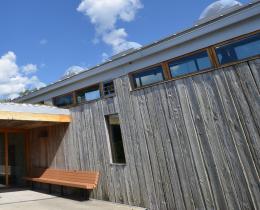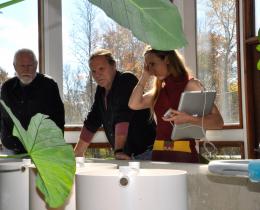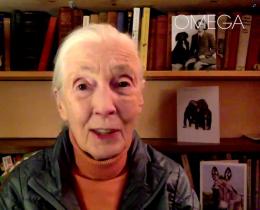They gathered in a rented movie theater in Austin, Texas.
In a church in Bozeman, Montana.
At a bar in Brooklyn, an eco-retreat in Hawaii, and a half-dozen libraries in Vermont.
In all, they came together in 17 states and at least three countries.
On October 19, viewers from more than 50 satellite sites tuned in to watch an online broadcast that opened the Omega Center for Sustainable Living’s (OCSL) Drawdown Learn conference.
The live stream featured a rare gathering of the entire leadership team of Project Drawdown, the organization that brought us the New York Times best seller, Drawdown: The Most Comprehensive Plan Ever Proposed to Reverse Global Warming. And it served as a kickoff to the weekend-long gathering of educators, organizations, and communities seeking to integrate Drawdown's solutions-based approach within K-12 and higher education, as well as cross-sector and community leaders and groups looking to apply solutions in their fields.
“We are grateful to all of the satellite sites that organized collaborative and interactive viewings,” OCSL Director Laura Weiland said. “It is time to be big and bold in our efforts to reverse global warming. We look forward to working within the partnerships that were formed during the conference and coming together again next year, both in person and online.”
The satellite sites ranged from small groups of friends to a large municipal gathering attended by business, government, and nonprofit leaders.
“Climate change is giving us an opportunity to rewrite all of our current systems that are failing to support life on this planet,” said Danielle Trofe of Biomimicry NYC, which hosted a viewing at the Frying Pan Helm Bar in Brooklyn. “Shifting our minds could be the most powerful thing individuals can do as a solution.”
Drawdown Offers Hope After IPCC Report
Drawdown’s solutions-oriented message provided a welcome narrative on the heels of a grim new assessment from the Intergovernmental Panel on Climate Change. The IPCC report warned that the most severe effects of global warming are likely to become apparent much sooner than expected.
“The [Drawdown] solutions were empowering. They didn't leave us feeling we have to hope someone else solves our problems,” said Elizabeth Dunham of SEEDS, a nonprofit that hosted a viewing in Traverse City, Michigan.
In Austin, Texas, the city’s Office of Sustainability rented a movie theater and invited environmental leaders, educators, and nonprofit organizations engaged in climate work to learn more about Drawdown and brainstorm community-led carbon reduction projects and initiatives.
More than 80 people showed up for the simulcast, according to communications manager Amy Petri.
Immediately after viewing the live stream, the city assembled a panel of community leaders actively involved in climate issues.
“Each of the panelists spoke about the things that they are working on, their impressions of the simulcast, ways that others can get involved with their work, and key takeaways from the simulcast that would influence their work going forward,” Petri said.
Petri said the city’s Climate Plan will be updated in the coming year and that the city’s climate program manager will be working with community advisors to see which Drawdown solutions might fit for inclusion in the updated plan.
Participants Shift Their Perspective
In Bozeman, Montana, more than two dozen participants convened at the Unitarian Universalist Fellowship church. Bozeman is the seat of Gallatin County, where residents gather for an event called “Seat at Your Table” to discuss hopes and dreams for their neighborhoods and the county.
Sandy Kindt of the Unitarian Universalist Fellowship said some of the church’s members discussed taking issues of climate change and solutions to those meetings.
Indeed, if any one theme emerged from the satellite site organizers—and from the online comments of those who tuned in individually—it was a sense of hope, of the possible.
“The most powerful takeaway,” said Tim Jordan of Transition Town Northeast Minneapolis, “is the attitude, or perspective, and not just the technologies.”



